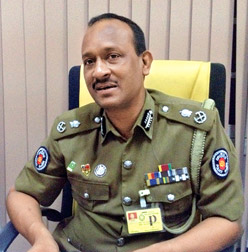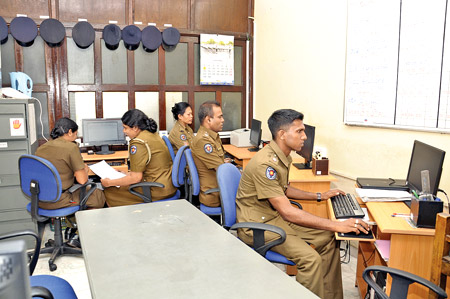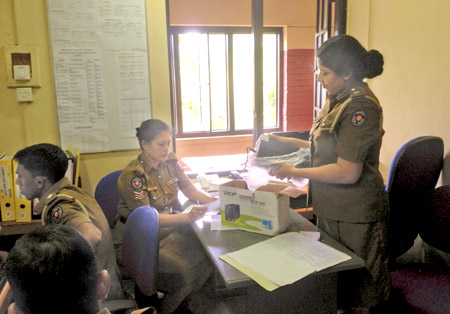Police Department goes high-tech
By Kurulu Kariyakarawana
The Sri Lanka Police Department (SLPD) is undoubtedly one of the most
experienced police forces in the world, not because it investigates
crimes reported each day, but due to the exposure it received by
fighting terrorism for nearly three decades.
 |
|
DIG W. F. U. Fernando - in charge of the
IT division. |
But unlike its sophisticated regional counterparts, the SLPD was
hardly anywhere close to the ever developing technology.
However, a significant change took place last week when the entire
department was introduced to a VPN system that would undoubtedly enhance
operations in maintaining the law.
VPN, which is the acronym for Virtual Private Network, is a system
which could extend a private network across a public network, such as
the internet. It enables a computer to send and receive data across
shared or public networks as if it is directly connected to the private
network, while benefiting from the functionality, security and
management policies of the private network.
In other words by adopting a VPN system the department could transfer
all its operations which had been limited to ‘old fashioned’ paper work
and manual handling into an integrated IT base system.
Until last week communication between a regular police station and
the police headquarters was limited to using facsimile or telephone
messages. But with the activation of the new system it gives the
opportunity to communicate through emails and video confer among senior
officials.
Apart from being engaged in day-to-day law enforcement operations, a
police station has numerous routine duties to perform in maintaining
functionality according to standards set up by the department. These
duties include of sending reports like daily reports, crime reports,
finger print reports, to send circulars as well as to transfer messages.
All these duties had been done using fax machines and paper to date. All
the Police Senior Superintendent Divisions receive these document from
each and every station listed under its area and purview daily and final
reports being prepared on these summaries are faxed to the HQ everyday.
 |
|
Officers at the VPN Ops
Room |
This consumes a lot of time and involves stacks of paperwork that has
to be stored and preserved for future reference. But when everything was
entered into a computer system it is a matter of clicking a button to
send them from one location to another.
The Virtual Private Network enables sending all these data through
email in a secure medium which could not be hacked by a third party. It
will fulfill one of the chief targets of the department to create a
paper-free working environment.
Most importantly this will link every police station in the country
into one main system where the Officer-in-Charge of particular station
could contact the Inspector General of Police on a video call at any
time through a private login only granted to the officer-in-charge.
The IGP could also hold a video conference with his nine Senior
Deputy Inspector Generals at the same time like a Skype call in a secure
manner. Every officer in charge of a station, special branch or unit, a
division, a district or a province including a range have been given an
unique login name and password to log into the system.
Another important benefit that could be harvested from this system is
sending or finding details of a wanted person. At present if an inquiry
is done by a police station regarding a suspect, that particular station
has to write to many other units or send messages to receive information
related to the suspect. But with the new system a special database would
be maintained about the information of criminals, suspects and missing
suspects which any inquiring officer could obtain without any hassle and
delay.
In relation to the VPN system several pilot projects are being
launched to monitor crime and intelligence data, administrative data and
automated fingerprint identification system.

DIG W. F. U. Fernando who is in charge of Police IT Division and
Police Field Force Headquarters in Bambalapitya explained to the Sunday
Observer how this concept was born in 2011. The need to set up an
interconnected service with security was much felt at that time where
DIG Fernando submitted a concept paper to the then IGP Mahinda
Balasuriya.
DIG Fernando who obtained his Bachelor's Degree in Business
Management from University of Jayawardenapura, is a Post Graduate
Diploma Holder in Public Management at SLIDA. He has an ICT Diploma from
Sweden and an EC Council in USA. Possessing a wide knowledge in the
field of IT, DIG Fernando prepared a cost estimate for the system which
received the approval of the Ministry of Defence and tenders were called
from 11 companies.
A tender board was appointed, lead by DIG Fernando to select the most
viable company. Lecturer of Moratuwa University Dr. Shehan Perera, MOD
Accountant, Mrs. S M Jayasinghe, Computer Engineer Tharaka Seneviratne
and OIC Software Development Unit of SLAF Squadron Leader T C Madduwage
took part in the tender board.
JIT Holdings (Just In Time) Holdings was selected to be the software
provider of the new system to work with Sri Lanka Telecom, which is the
official infrastructure provider. In the second phase of the project all
the OICs and officers above that will be given a special handset to
contact any other officer free of charge through the VPN system. SLT
Mobitel has agreed to facilitate this project.
Under the main project nine Senior DIGs, 22 Territorial DIGs, 18
Functional DIGs, 40 Teritorial SSPs, 50 Functional Directorate SSPs, 62
Headquarters Inspectors and all the 24 OICs in Colombo will be linked
together.
A special Operations Room had been established in Field Force
Headquarters in Bambalapitiya to respond to any technical or other
emergency surfaces through the new system. VPN Ops Room is headed by its
OIC Chief Inspector N. D. B. Attanayake, Sub Inspectors R. K. Ratnayake,
H. K. E. Harshaka, S. P. D. Nishantha, WSI G. N. Ruwan Pathirana, WPS
Shereen Wansajaya, PC D. H. M. S. M. Dissanayake and WPC L. R. Nayana
Gunaratne. |

